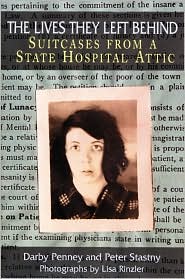St. Dymphna is the patron saint of people who have mental health problems, their families and loved ones, and people who are mental health care givers. She is also the patron saint of people who are the survivors of incest. There is a very special place that came about because of her where people with mental health are treated with the dignity, respect, and opportunity to heal that they deserve. To read more about the village of Gheel, Belgium and St. Dymphna's connection with this special community,
click here: wilkes.zftp.com/Gheel

I was inspired to post about St. Dymphna because I just finished reading The Lives They Left Behind by Darby Penney and Peter Stastny, with photographs by Lisa Rinzler. It is a truly sobering account of individuals incarcerated in the New York State mental health system sparked by the discovery of hundreds of suitcases filled with peoples personal belongings in an attic at Willard when the giant institution was shut down. The book focuses on the lives of ten suitcase owners whom the authors researched, finding out as much as they could about who they actually were, and their personal histories. One thing I like about this book is that by it's nature it highlights the fact that each human being is valuable, interesting, and important. That for the few things you can discover about a person there is much that is unknowable and will remain a mystery, but never the less exists. It is an important reminder on a planet where so many, many people dwell together, and where we assume so much about each other without really knowing each other or valuing each others existence. Another thing I like about this book are the questions the authors ask about each person, the questions that should have been asked if these people were actually being offered anything theraputic, which they were not. I like that the authors draw the connection between trauma and it's effect on mental health and the importance of addressing the trauma to help people heal, as opposed to assuming that they are simply defective and that there is no connection between life events and our mental state.
Sadly, the authors see a great deal still lacking in what the mental health system and modern psychiatry have to offer people in need. That people are further traumatized by what should, instead, be helping them is scary and sickening and makes me afraid for some people who are very dear to me. There is a need for the benefits of a community like Gheel to be considered and put into practice in the rest of the world so that no one is further victimized by ignorance and prejudice.
There is also an on-line exhibit connected with the book: suitcaseexhibit.org




